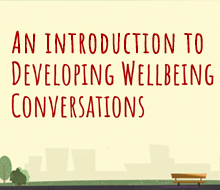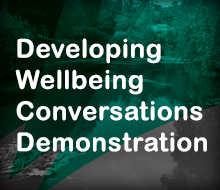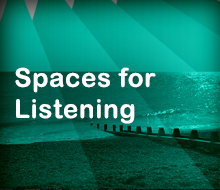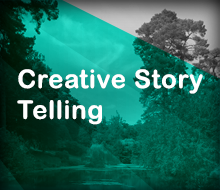Introduction - Staff Recovery Resources
Emotional and psychological support spaces for NHS staff
These resources have been created to support healthcare staff recovering from the COVID-19 pandemic. The resources have been curated by the London Transformation and Learning Collaborative. Not all people approach wellbeing by the same means. These resources acknowledge those differences and cover a variety of approaches, such as Wellbeing Conversations, Creative Story Telling workshops and a mini-series of filmed conversations with critical care workers starting with a discussion around Moral Injury. All the resources help health and care staff explore how they feel and how they might respond to those around them.
Materials to support “Negotiating Brave Conversations” have now been added to this page as well so that these sessions can be facilitated within NHS Trusts/Integrated Care Systems.
Follow updates on Twitter using the hashtag #NHSLTLC or HEE London @NHSHEE_LDN![]()
Creating Spaces for Wellbeing
How do we cope with all that life throws at us? Especially since the pandemic began in 2020? Life, both at work and at home, has changed beyond recognition and many of us, as well as the systems we work in, are finding it challenging to adapt.
Spaces for Wellbeing are resources for staff that can be facilitated for colleagues by anyone who feels able, in order to support themselves and others. We offer a range of spaces as we recognise people may need differing approaches depending on their circumstances, preferences and personal needs.
Please explore the resources below. For each, you will find a description and a short film introduction about the space. There is further reading and guides for facilitators where appropriate.
Good luck and please let us know how you get on at LTLC@hee.nhs.uk.
Developing Wellbeing Conversations
Our NHS People website calls for wellbeing conversations to become part of the working week as, “at their heart, Health and Wellbeing Conversations are a way for two people to connect together to identify individual health and wellbeing needs.”
The LTLC offers an approach to facilitating wellbeing conversations here. The short film below introduces the concept of Developing Wellbeing Conversations. To provide guidance in advance and support whilst you have one of these conversations, there are downloadable prompt cards (PDF, 81KB) and a guide (PDF, 85KB) to using them.
To see one of these conversations in action there is a demonstration film below (15 mins) showing an example conversation between two nursing colleagues and a table of notable elements (PDF, 200KB) to guide your viewing.
Having accessed our resources, we encourage you to practise wellbeing conversations where you feel able and confident to do so. Additional guidance on how we might engage in such conversations is offered through the Our NHS People website and app.
Further reading:
- Our NHS People guide – useful principle led guidance on facilitating wellbeing conversations.
- Article about supporting clinicians through peer conversations.
- Film clip about doctors in distress.
- A moving clip from an expert in compassion.
-
Developing Wellbeing Conversations – Introduction
Developing Wellbeing Conversations – Introduction
-
Developing Wellbeing Conversations - Demonstration
Developing Wellbeing Conversations - Demonstration
Spaces for Listening
Spaces for Listening was created in 2020 by leadership coach, Brigid Russell and psychologist, Charlie Jones. Participation engenders a greater attention to others, reflection on similarities and differences and a recognition of the power of listening. Participating often develops a sense of calm, an attentiveness to others and a greater sense of perspective.
This space offers an hour-long session for 8 people to come together and share their thoughts, feelings and reflections in a safe environment.
Further reading:
- A reflective piece from the creators of the approach.
- More details about the Spaces for Listening approach.
- Useful piece about the power of listening for the listener.
Sessions – 1 hour, up to 8 participants
Facilitator Guides can be found at the bottom of this page.
-
Spaces for Listening
Spaces for Listening
Creative Story Telling
Creative Story Telling workshops build on the role of narrative theory in a range of wellbeing initiatives from therapeutic and psychological support to the relaxing and creative. In developing our story telling skills we can process our experiences, make sense of chaos, explore, grieve, rejoice, reflect, connect and feel less alone. One of our facilitators says story telling is exercise for the soul.
These sessions are inspired by the success of The Re-humanising Revolution (2019) which has published over 170 stories since its creation in February 2019. This blog curates and hosts stories from colleagues in healthcare, education and related professions. It acts as a space for people to share their experiences and to reflect on the experiences of others.
Further reading:
- Powerful TedTalk on the power of story telling.
- Article about story telling (magazine pages no 28-29, show as page no. 30-31 on finder bar).
- Ideas for story telling.
Sessions – 1 hour, up to 16 participants
Facilitator Guides can be found at the bottom of this page.
-
Creative Story Telling
Creative Story Telling
Debrief
Debriefing is well established in healthcare teams after acute events, with a focus on clinical learning, improving practice and performance; however, the term is interpreted in many ways as are the processes used to facilitate debriefs. This webinar delivered for the Intensive Care Society in 2020 looks at the history of debriefs and the evidence base for and against presented by two clinical psychologists who work in staff support and wellbeing. It looks at the purpose of debriefs and their uses, as well as offering some alternatives for group interventions.
Further reading:
- What can psychologists offer teams after difficult events
- Fifteen-minute consultation: Time Out as an alternative to toxic debrief
- Developing a programme of staff support in a children’s hospital
- Poster: Responding to stress experienced by hospital staff working with Covid-19: guidance for planning early interventions
- “I made a mistake!”: A narrative analysis of experienced physicians’ stories of preventable error
- Brian Goodman on the powerful subject of making mistakes.
- Article on the relationship between DEBRIEF and feedback.
Negotiating Brave Conversations
“Negotiating Brave Conversations” sessions were developed in response to feedback the LTLC received from nursing leaders in the spring/summer of 2021. It was suggested that conversations around further redeployment would be more challenging than had previously been the case given that staff knew what to expect from changes to their working week and were burned out, fearful and anxious of having to work in unfamiliar areas again. A series of sessions took place in June and July 2021. in anticipation of another surge in the Covid-19 pandemic. Now the materials for delivering these sessions independently are offered here.
The Brave Conversations provision was centred around 2 sessions:
- A one-hour Spaces for Listening session where the 3 questions were tailored to surge working;
- A two-hour workshop during which participants were invited to practise an approach to conducting conversations that aimed to level up the contributions of both manager and staff member, to prepare each for potential redeployment and to encourage staff agency in preparing for such a move.
Spaces for Listening followed the same model outlined elsewhere in these materials with amended questions which were:
- What do you find challenging about holding conversations with colleagues (surge working or otherwise?)
- In an ideal world how would these conversations work?
- What might you take forward in your conversations as a result of this session?
The brave conversations workshop which followed focused on asking open, coaching style questions using two models: SOFT and IRIS.
Facilitator Guides can be found at the bottom of this page.
Further reading:
Moral Injury
Starting with an exploration of moral injury this series of films includes conversation with Dr Esther Murray exploring some of the impacts of the pandemic on staff. The films look at issues from different aspects including leaders, team members and healthcare psychologists. These were filmed in November 2020 by the LTLC team and edited specifically to address the needs in our workforce, both in critical care and beyond.
The 6 films cover 1) Understanding Moral Injury, 2) how to handle it when you recognise moral injury in someone and 3) how to try and re-claim space for connection with each other.
They also discuss 4) Recognising how hard people find it during a pandemic to switch off from work and so managing our addiction to WhatsApp and other social media outlets.
The team discuss 5) Preparing for deployment from the perspective of the new and old team members and finally 6) how to manage requests to work more shifts, considering the challenges facing the person being asked and those that have to make these requests.
Each film is accompanied by reflective questions and, where appropriate, links to further reading.
Bitesize.healthcare - Instagram
The bitesize.healthcare Instagram page offers a collection of honest, candid insights from health care professionals. These individuals share how they look after themselves and or their team and how they keep patients safe with their non-technical skills. Each clip is no longer than 90 seconds.

Other resources
- NHS People: Useful guides on looking after ourselves and each other
- Good Thinking: Digital and mental wellbeing for London
- Minded: elearning to support healthy minds
- Resilience Hub: Staff resilience hub
- Re-humanising Revolution: Stories from healthcare and education, with a focus on humanity
- Brené Brown on vulnerability
- Caroline McHugh on the art of being yourself
- Madeleine Bunting on humanity
- Article about loss and grief
- Blog on how healthcare professionals cope with extreme circumstances
Facilitator resources
We invite you, if you wish, to facilitate your own sessions and to use the guidance supplied here to ensure maximum benefit for all. These resources are given freely to everyone, on condition that the guidance for each is followed.
Group sizes are carefully decided to make sure every participant has sufficient opportunity to participate, and we strongly suggest that group size limits, both minimum and maximum, are adhered to. We know that it can be difficult to avoid understandable attrition within busy clinical work, and suggest that clear instruction is given at the joining stage to ensure participants know that there is a risk of cancellation if insufficient numbers occur. All sessions have suggested joining instructions included.
Below you will find as appropriate:
- Facilitators guides
- Joining instructions to send out to participants
- Relevant materials
-
Spaces for Listening
Sessions – 1 hour, 8 participants
- Facilitators guide
- Joining instructions to send to participants
- Running guide
-
Creative Story Telling
Sessions – 1 hour, between 6-16 participants
-
Negotiating Brave Conversations
- Negotiating Brave Conversations workshop Facilitation Notes
- Negotiating Brave Conversations Workshop slides
- Negotiating Brave Conversations Workshop Pre-session Handout
- Spaces for Listening, Negotiating Brave Conversation version – Facilitator Notes
- Spaces for Listening, Negotiating Brave Conversation version – Joining Instructions








